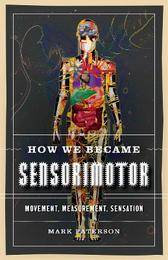
|
How We Became Sensorimotor: Movement, Measurement, Sensation
Paperback / softback
Main Details
| Title |
How We Became Sensorimotor: Movement, Measurement, Sensation
|
| Authors and Contributors |
By (author) Mark Paterson
|
| Physical Properties |
| Format:Paperback / softback | | Pages:320 | | Dimensions(mm): Height 216,Width 140 |
|
| Category/Genre | History of science |
|---|
| ISBN/Barcode |
9781517910006
|
| Classifications | Dewey:152.1 |
|---|
| Audience | | General | | Professional & Vocational | |
|---|
| Illustrations |
23 black & whilte illustrations
|
|
Publishing Details |
| Publisher |
University of Minnesota Press
|
| Imprint |
University of Minnesota Press
|
| Publication Date |
26 October 2021 |
| Publication Country |
United States
|
Description
An engrossing history of the century that transformed our knowledge of the body's inner senses The years between 1833 and 1945 fundamentally transformed science's understanding of the body's inner senses, revolutionizing fields like philosophy, the social sciences, and cognitive science. In How We Became Sensorimotor, Mark Paterson provides a systematic account of this transformative period, while also demonstrating its substantial implications for current explorations into phenomenology, embodied consciousness, the extended mind, and theories of the sensorimotor, the body, and embodiment. Each chapter of How We Became Sensorimotor takes a particular sense and historicizes its formation by means of recent scientific studies, case studies, or coverage in the media. Ranging among a diverse array of sensations, including balance, fatigue, pain, the "muscle sense," and what Maurice Merleau-Ponty termed "motricity," Paterson's analysis moves outward from the familiar confines of the laboratory to those of the industrial world and even to wild animals and their habitats. He uncovers important stories, such as how forgotten pain-measurement schemes transformed criminology, or how Penfield's outmoded concepts of the sensory and motor homunculi of the brain still mar psychology textbooks. Complete with original archival research featuring illustrations and correspondence, How We Became Sensorimotor shows how the shifting and sometimes contested historical background to our understandings of the senses are being extended even today.
Author Biography
Mark Paterson is associate professor of sociology at the University of Pittsburgh. He is author of The Senses of Touch: Haptics, Affects and Technologies and Seeing with the Hands: Blindness, Vision and Touch after Descartes, as well as coeditor of Touching Space, Placing Touch.
Reviews"Opening a new chapter in the archaeology of knowledge and the body, How We Became Sensorimotor charts how the inchoate mass of sensations within the bodily interior became the focus of increasingly intensive scientific inquiry from the mid-1800s onwards. To read this deeply touching book is to come to know one's innermost self from a rigorously empirical and objective yet intimately familiar angle."-David Howes, author of The Sensory Studies Manifesto "Through rigorous archival research and fieldwork, Mark Paterson meticulously documents the historical practices that made the 'sensorimotor' body a thinkable concept. Crisscrossing neurology, experimental physiology, phenomenology, and chronophotography, How We Become Sensorimotor tells the fascinating story of the academic disciplines and artistic worlds that lodged internal sensations at the core of what it means to be a body."-Erica Fretwell, author of Sensory Experiments: Psychophysics, Race, and the Aesthetics of Feeling
|